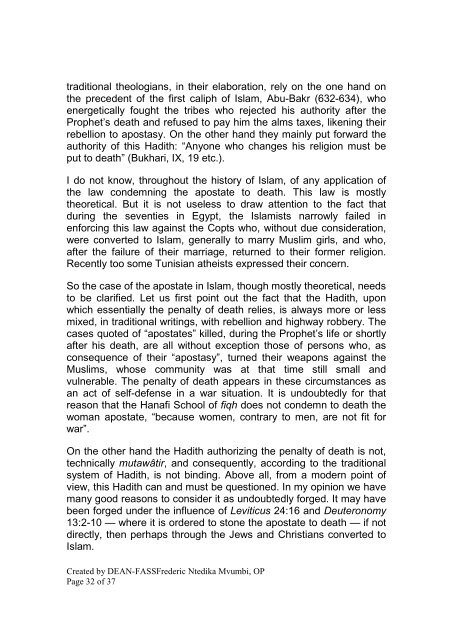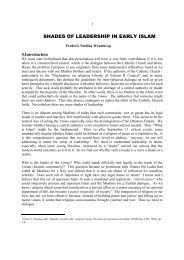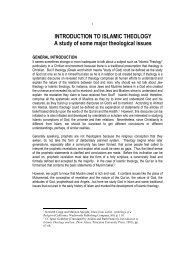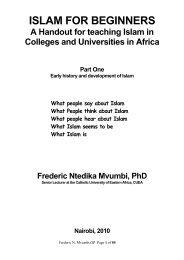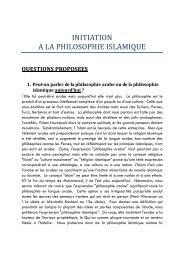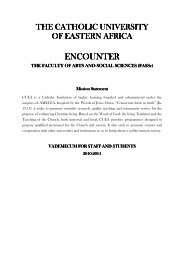PRINCIPLES FOR INTERRELIGIOUS DIALOGUE.pdf - CUEA
PRINCIPLES FOR INTERRELIGIOUS DIALOGUE.pdf - CUEA
PRINCIPLES FOR INTERRELIGIOUS DIALOGUE.pdf - CUEA
You also want an ePaper? Increase the reach of your titles
YUMPU automatically turns print PDFs into web optimized ePapers that Google loves.
traditional theologians, in their elaboration, rely on the one hand on<br />
the precedent of the first caliph of Islam, Abu-Bakr (632-634), who<br />
energetically fought the tribes who rejected his authority after the<br />
Prophet’s death and refused to pay him the alms taxes, likening their<br />
rebellion to apostasy. On the other hand they mainly put forward the<br />
authority of this Hadith: “Anyone who changes his religion must be<br />
put to death” (Bukhari, IX, 19 etc.).<br />
I do not know, throughout the history of Islam, of any application of<br />
the law condemning the apostate to death. This law is mostly<br />
theoretical. But it is not useless to draw attention to the fact that<br />
during the seventies in Egypt, the Islamists narrowly failed in<br />
enforcing this law against the Copts who, without due consideration,<br />
were converted to Islam, generally to marry Muslim girls, and who,<br />
after the failure of their marriage, returned to their former religion.<br />
Recently too some Tunisian atheists expressed their concern.<br />
So the case of the apostate in Islam, though mostly theoretical, needs<br />
to be clarified. Let us first point out the fact that the Hadith, upon<br />
which essentially the penalty of death relies, is always more or less<br />
mixed, in traditional writings, with rebellion and highway robbery. The<br />
cases quoted of “apostates” killed, during the Prophet’s life or shortly<br />
after his death, are all without exception those of persons who, as<br />
consequence of their “apostasy”, turned their weapons against the<br />
Muslims, whose community was at that time still small and<br />
vulnerable. The penalty of death appears in these circumstances as<br />
an act of self-defense in a war situation. It is undoubtedly for that<br />
reason that the Hanafi School of fiqh does not condemn to death the<br />
woman apostate, “because women, contrary to men, are not fit for<br />
war”.<br />
On the other hand the Hadith authorizing the penalty of death is not,<br />
technically mutawâtir, and consequently, according to the traditional<br />
system of Hadith, is not binding. Above all, from a modern point of<br />
view, this Hadith can and must be questioned. In my opinion we have<br />
many good reasons to consider it as undoubtedly forged. It may have<br />
been forged under the influence of Leviticus 24:16 and Deuteronomy<br />
13:2-10 — where it is ordered to stone the apostate to death — if not<br />
directly, then perhaps through the Jews and Christians converted to<br />
Islam.<br />
Created by DEAN-FASSFrederic Ntedika Mvumbi, OP<br />
Page 32 of 37


